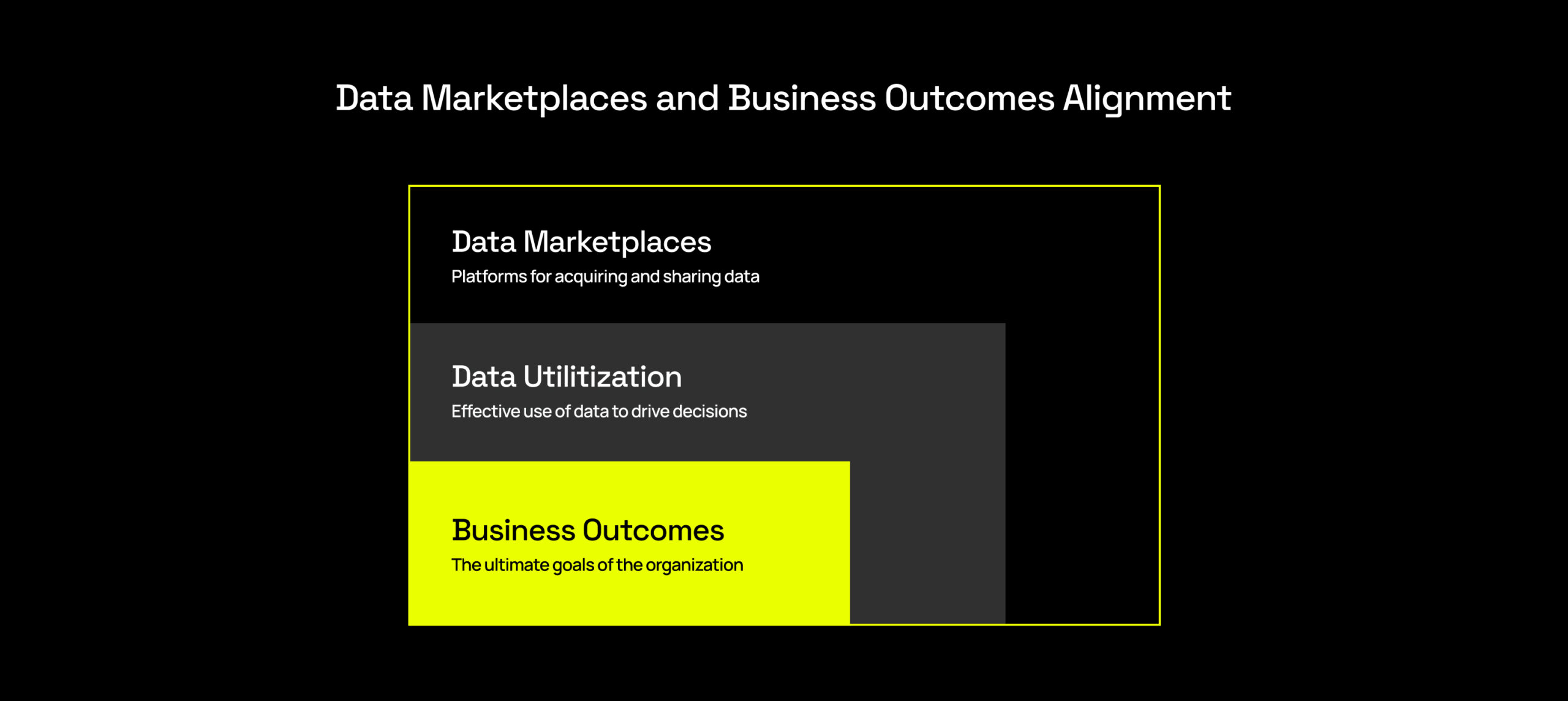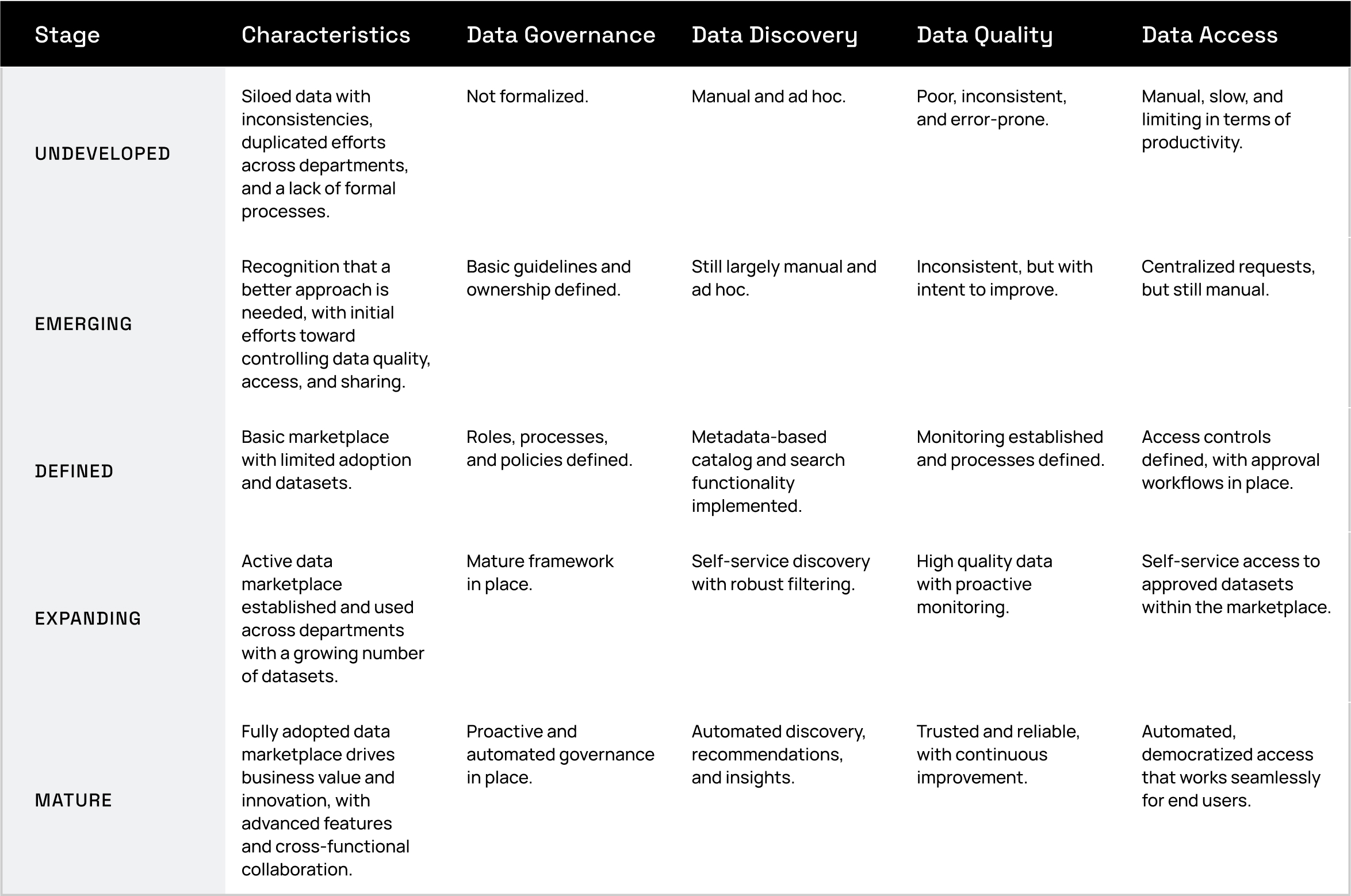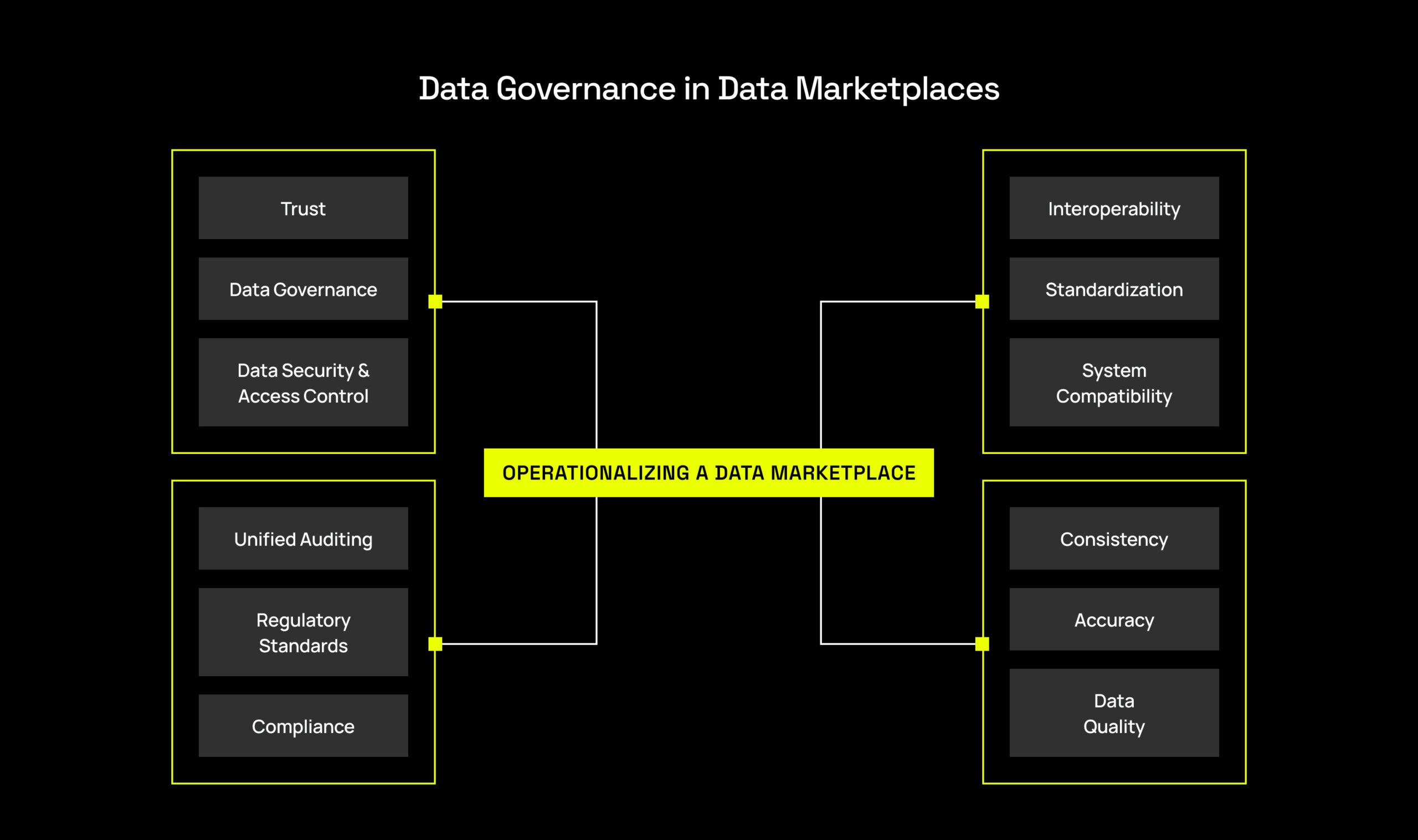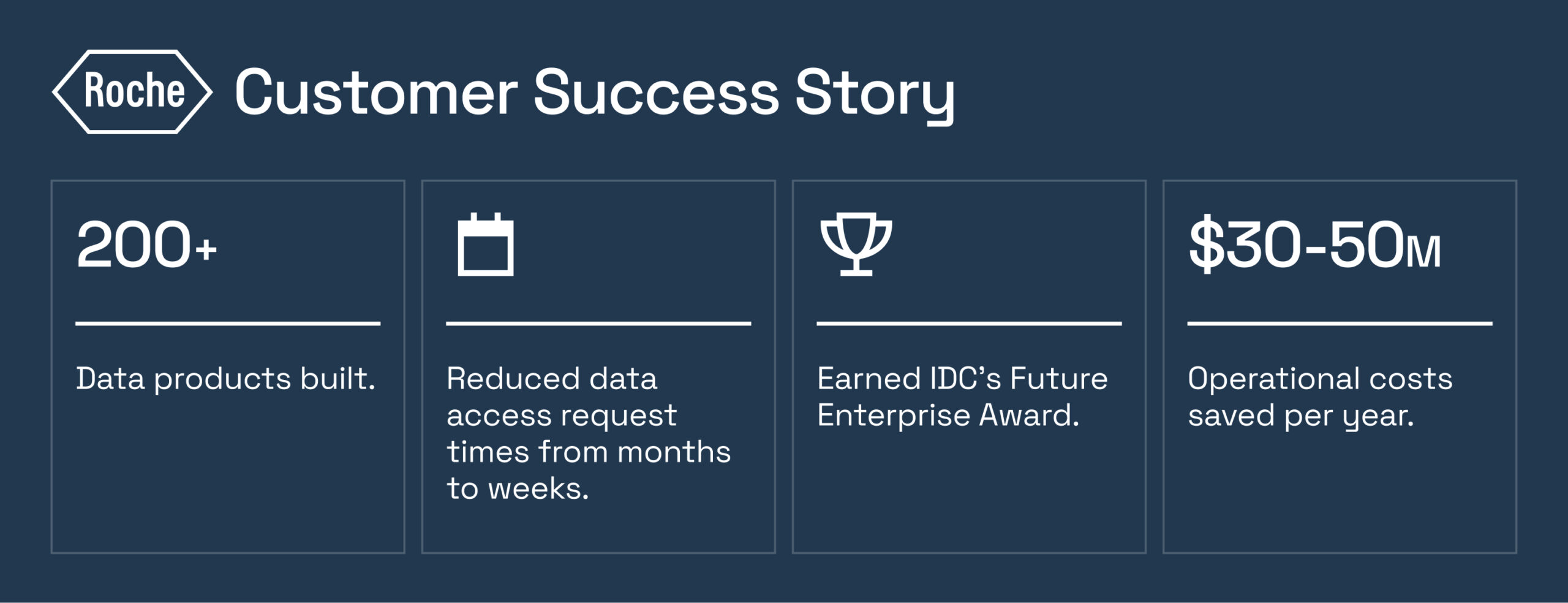Data powers everything in today’s market, from insights and innovations, to competitive advantages. Without it, organizations struggle to grow, compete, and function efficiently.
Yet, for many teams, accessing, managing, and leveraging data effectively remains a significant challenge. Whether you’re a data consumer seeking streamlined access to insights or a data steward aiming to better manage data products, understanding your organization’s maturity in the context of increasingly popular data marketplaces is critical to realize its full potential.
After working with hundreds of customers, we understand the importance of knowing the stages of maturity when it comes to your data marketplace and data product initiatives. This allows you to put the right tools, people, and processes in place from the outset, so you see ROI more quickly. In this blog, we’ll explore these maturity stages, potential obstacles, and how a platform like Immuta is designed to streamline your marketplace implementation – quickly, securely, and at scale.
The path to data marketplace maturity
Maturity in a data marketplace isn’t just about technology — it’s about aligning data capabilities with business outcomes. Each step forward increases your ability to leverage data for better decision-making and innovation. Regardless of your starting point, advancing your data marketplace can provide measurable improvements to discoverability, trust, and collaboration.

Stages of data marketplace maturity
To envision where you fall on the data marketplace maturity spectrum, you need to first understand what the stages are. We suggest dividing into five key phases, each of which corresponds to a different aspect of data marketplaces – governance, discovery, quality, and access:

Challenges to advancing data marketplace maturity
As organizations evolve their data marketplaces, they often encounter common hurdles. In order to gain and sustain buy-in for data marketplace initiatives, and to ensure they reach their full potential, it’s important to anticipate – and mitigate – some common challenges.
Discoverability gaps
Limited metadata can make finding the right datasets difficult, causing users to sift through data without fully understanding its context, contents, and quality. Adequate search functionality and visualization capabilities are also necessary to getting users to the right datasets more quickly. Absent these, locating the right data will be a more inefficient and frustrating process.
Data quality issues
Inconsistent standards – in data formats, naming conventions, or definitions, to name a few – reduce trust in data products, making users less likely to use and share them. Any errors or inconsistencies in data validation or maintenance processes can also impact downstream analysis and decision-making, eroding trust in the marketplace as a whole.
Governance complexities
Manual processes slow down scalability of data marketplaces, and increase risks. Without clearly defined roles and responsibilities, there will be confusion about who owns what part of the governance process, and how data has evolved over time.
Cultural barriers
Change management is critical when implementing a data marketplace. A reluctance to break down data silos, share data products across departments, or buy into a new way of finding and accessing data can limit adoption and lead to risky workarounds that fall outside the purview of established governance processes.
Overwhelmed?
We get it. These challenges can delay insights, hinder collaboration, and introduce compliance risks. At the same time, tackling them can seem daunting. You may be at an early stage of data marketplace maturity, feeling like you can’t even see the top of the mountain you’re about to climb. Or you may have taken the first steps toward implementing a data marketplace, but have hit a roadblock that you can’t get past.
In our experience with customers, this is normal. With the right tools in your tech stack, you can advance your maturity without confusion, delays, or risks. Here’s how Immuta helps get you there.
How Immuta drives data marketplace maturity
To build and mature a data marketplace, a data governance strategy is essential. Without it, organizations will struggle to establish clear roles and responsibilities, while data silos and communication challenges persist.
Data governance helps foster trust in data, encourages collaboration, and mitigates risks, clearing the path for data products to be efficiently created and shared within a data marketplace. The better the data marketplace operates, the more widely adopted and mature it will become. And when the marketplace is embedded in everyday processes, its capacity to deliver tangible business results grows exponentially.
The Immuta Data Marketplace solution simplifies data access and governance, supporting both data consumers and stewards to maximize the value of their data. This is done through:
Data cataloging and metadata visibility
Immuta doesn’t just organize datasets – it transforms them into a living, searchable inventory. By integrating with existing data catalogs and leveraging Immuta’s sensitive data discovery and classification capabilities, it enriches data assets with comprehensive metadata. The Immuta metadata registry allows users to quickly locate the data they need and understand its context, quality, and sensitivity at a glance. Imagine a Google Search for your data, but with built-in guardrails to ensure responsible use.
Data product consistency
Immuta helps create a blueprint for your data, by defining ownership, purpose, granular access controls, and even naming conventions. This ensures consistency across teams, eliminating confusion and enabling better collaboration. With clear, consistent data product management, you can avoid miscommunications and put data products to work faster.
Automated policy enforcement
Immuta’s policy entitlement engine takes the manual burden out of data security and governance. Its dynamic access control automatically applies policies and prevents unauthorized access, with no performance impact to end users. This not only reduces the risk of human error and security breaches, but also ensures compliance with ever-evolving data regulations.
Self-service analytics
Immuta empowers users with a secure, compliant environment for data discovery and analysis. This allows them to independently derive insights without compromising security, governance, or productivity. In turn, data consumers are able to accelerate decision-making, foster innovation, and put valuable data assets to work.
Continuous improvement tools
Immuta doesn’t just provide a snapshot of your data usage – it gives you a dynamic roadmap for improvement. By analyzing audit logs and usage patterns, Immuta’s unified audit capability reveals valuable insights into data access, policy effectiveness, and potential bottlenecks. This allows you to proactively refine your data governance practices, optimize your data marketplace, and mitigate threats before they become reality.

Why does data marketplace maturity matter?
Advancing your data marketplace isn’t just about improving data management. It’s about getting more usage and value out of data products, and ultimately driving business results.
Organizations that successfully implement internal data marketplaces benefit from:
Improved collaboration
Teams are able to work more effectively with trusted, accessible data – and a mature marketplace makes finding and sharing that data much easier. By serving as a hub for publishing, searching, accessing, and sharing data products, marketplaces break down data silos and foster transparent collaboration. When cross-functional teams are able to leverage common data products, they’re able to reduce friction and build a shared understanding of the company’s data.
Faster insights
A mature data marketplace streamlines data access, automates workflows, and eliminates bottlenecks, freeing up valuable time and resources. Without manual or repetitive processes, teams can focus on higher-value tasks, driving productivity and business outcomes.
Informed decision-making
With data governance as a bedrock, mature data marketplaces ensure data integrity and compliance, empowering leaders to act confidently. They can identify new patterns and opportunities, and make data-driven decisions that directly impact business goals – without concerns that their data is inaccurate or unauthorized.
A mature data marketplace enables organizations to scale their data strategy and achieve transformative outcomes securely and efficiently. Global pharmaceutical leader Roche leveraged Immuta to accelerate data product delivery, and the results speak for themselves.

Start transforming your data marketplace strategy
No matter where you are on your data marketplace journey, Immuta is here to help you take the next step. Our platform empowers data consumers and stewards alike to put more of their data to work — securely, compliantly, and at scale.
Schedule a demo today and see how the Immuta Data Marketplace solution can unlock the full potential of your data.
Get started.
See the Immuta Data Marketplace solution for yourself.







